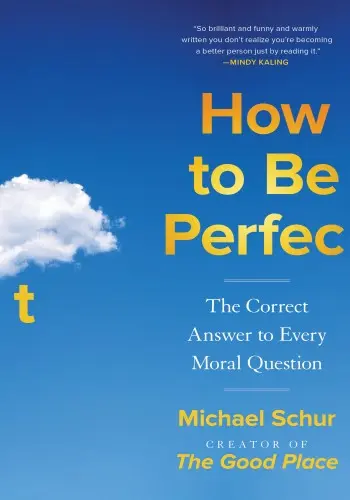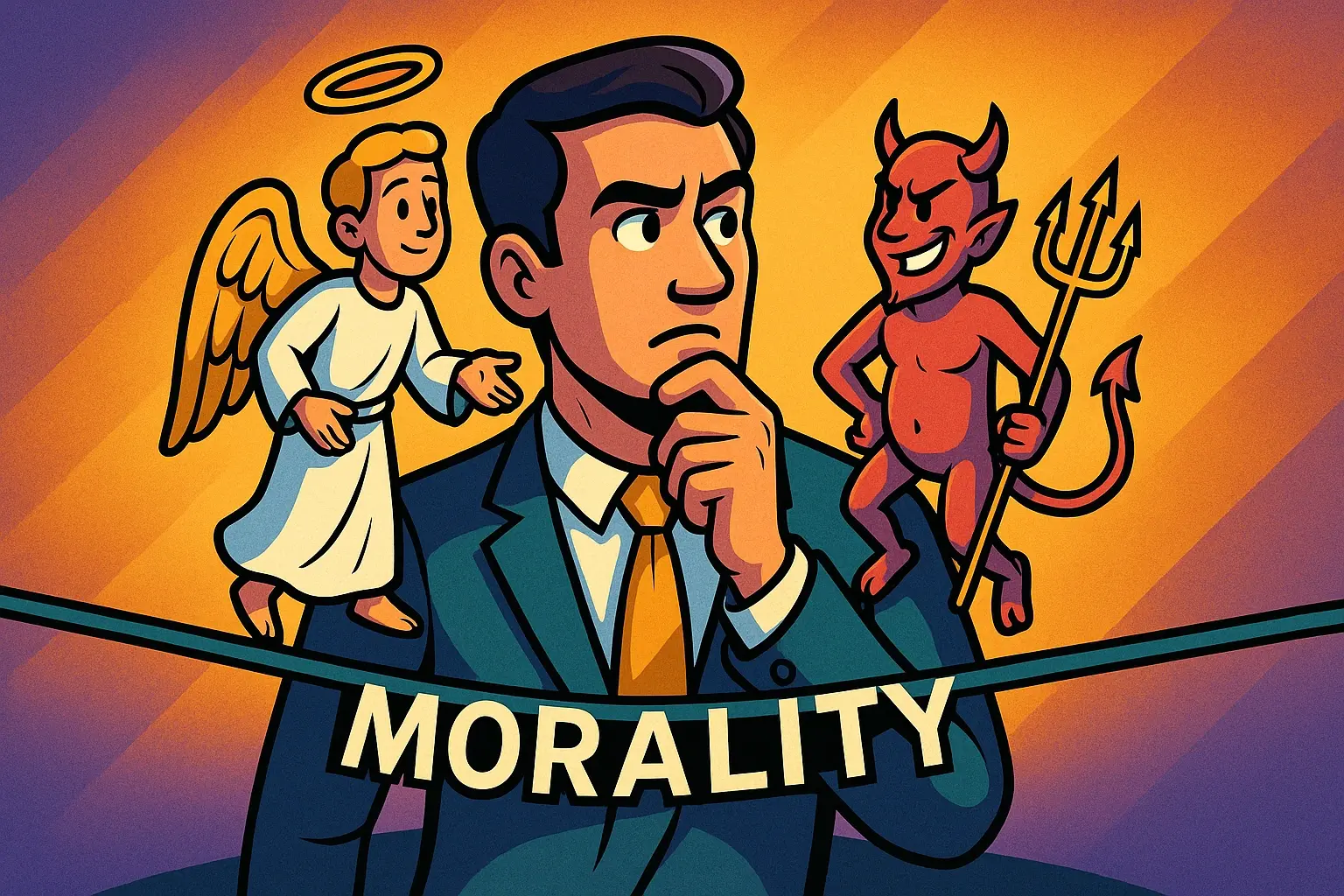
How to Be Perfect
By Michael Schur
Published October 2, 2025
Michael Schur turns the wild moral puzzles from The Good Place into a conversational guide for real life. Blending jokes with philosophy, he explains virtue ethics, Kantian duty, utilitarian calculations, and Ubuntu’s communal wisdom in plain English. Each chapter tests the theories against everyday dilemmas—white lies, heroic sacrifices, social media shame spirals, and the impossibility of making ethically pure purchases. The result is a playbook for trying, failing, apologizing, and trying again with more empathy. Instead of chasing impossible perfection, Schur urges us to build habits, ask better questions, and become the kind of neighbors who make goodness feel doable.
Key Lesson
Moral progress comes from caring how your choices land on other people and adjusting when they do harm.
Choose Compassion Daily
Book Snapshot
ISBN
9781982159313
ASIN
B093R3JQ7S
Topics & Search Phrases

Full Summary
Michael Schur opens How to Be Perfect with the same disarming silliness that made The Good Place a cult favorite, but the joke quickly gives way to a serious promise: morality does not belong to professors in tweed jackets. It belongs to the rest of us who are just trying to figure out whether we should punch a friend in the face, sneak a free HBO password, eat chicken raised in miserable conditions, or bail on a coworker’s improv show. Schur admits he is not a philosopher, merely a comedy writer who got in too deep, yet he treats that confession as an asset. His goal is to translate a few thousand years of ethical thought into a voice you would actually want to hear at a backyard cookout. The introduction explains why the point-scoring system from The Good Place was destined to implode in today’s messy world, and how philosophy can help us move from instinctive “good versus bad” labels toward more nuanced answers like “good, but also complicated.”
Part One lays the groundwork by walking through “the big three” ethical frameworks and a handful of supporting voices. Virtue ethics, courtesy of Aristotle, comes first. Schur highlights Aristotle’s conviction that character is built through practice, the way you might learn to play guitar or grow tomatoes. A virtue sits between two vices—courage between cowardice and recklessness, generosity between stinginess and wastefulness. Schur keeps reminding us that Aristotle was not obsessed with sainthood; he was obsessed with flourishing. The book uses real-life examples to make the point, such as practicing honesty in small conversations so that it becomes second nature, or deliberately rehearsing empathy until it feels as natural as scrolling Instagram. Virtue ethics, Schur argues, is comforting because it treats goodness as muscle memory, something we can strengthen even if we have historically made selfish choices.
Once virtue ethics gives us an aspirational picture of “a good person,” Schur pivots to Kantian deontology, the idea that certain duties bind us regardless of how we feel about them. Kant’s categorical imperative appears intimidating at first, but Schur translates it into everyday tests: What would happen if everyone acted the way you are about to act? Are you treating people as ends in themselves or as props in your personal movie? The chapter explores how these questions apply to white lies, RSVP obligations, and the temptation to ghost someone who keeps texting about a group project. Schur points to the moral clarity Kant offers when we are tempted to rationalize harm, especially when convenience and self-interest whisper louder than compassion. At the same time, he acknowledges why Kant can feel rigid, and he jokes about the philosopher’s love of rules by imagining a version of The Good Place where every choice requires filling out a thirty-page ethics form in triplicate.
No moral toolkit is complete without utilitarianism, the philosophy that demands we maximize net happiness. Schur traces the lineage from Jeremy Bentham’s hedonic calculus to John Stuart Mill’s upgraded version that values quality of pleasure as much as quantity. The narrative revisits the trolley problem, inevitably, but uses it to show why utilitarianism scales beyond dramatic hypotheticals. Should you give to global health charities you have never visited? Should a company recall a product if the cost will bankrupt the founders? Utilitarianism shoves every decision into a spreadsheet of costs and benefits, which can help strip away sentimental excuses yet also risks sacrificing the individual for the abstract many. Schur shares stories where pure consequentialism goes sideways—think of corporate scandals that justified cutting corners “for the greater good”—and he argues for gut-checking utilitarian calculus with virtue and duty so we do not accidentally become villains with a spreadsheet.
Part Two shifts from theory to practice, starting with the question of heroic sacrifice. Schur tells the story of Jack Lucas diving onto grenades at Iwo Jima and asks how much heroism regular people owe one another. With the help of philosophers like Peter Singer, Judith Jarvis Thomson, and Susan Wolf, he parses the difference between what is morally required and what is saintly extra credit. The takeaway is reassuring: moral life is less about dramatic martyrdom and more about showing up reliably for one another. The book applies this nuance to everyday scenarios—returning a lost wallet, intervening when a friend makes a racist joke, volunteering beyond your bandwidth—and reminds us that aspiring to be perfect does not excuse burnout or moral self-flagellation.
Schur then tackles honesty, loyalty, and promises, inviting readers into scenarios that feel ripped from awkward group chats. Should you attend a friend’s fundraiser when you are already emotionally depleted? Is it okay to lie about loving your partner’s experimental cooking? When do white lies prevent harm, and when do they erode trust? The narrative leans on contractualism—particularly T. M. Scanlon’s famous question, “What do we owe to each other?”—to evaluate obligations. Contractualism asks us to imagine principles that no one could reasonably reject, which means considering the perspectives of every stakeholder. Schur notes how this framework guided The Good Place’s moral arc and suggests using it as a conversational tool: gather your people, name the competing interests, and negotiate a fair principle together. The act of hashing it out, he insists, is itself moral work.
Modern dilemmas get their own spotlight. The book explores consumer ethics in a globalized economy, acknowledging how impossible it feels to buy a simple tomato without accidentally supporting child labor, pesticide abuse, or carbon-heavy shipping. Schur revisits the Good Place point system to demonstrate how unintended consequences have multiplied in a world of algorithmic advertising and supply chains that stretch around the planet. Instead of demanding moral purity, he recommends incremental improvements—choose one habit to change, like reducing fast fashion purchases or donating a percentage of optional spending to effective charities—and celebrate progress. The section on social media pauses to ask whether piling onto a public shaming spree actually makes the world better or merely scratches our itch to feel righteous. Schur suggests replacing moral outrage doomscrolling with quieter actions: call your representative, mentor a teenager, or bring soup to a neighbor.
Part Three broadens the moral lens by introducing philosophies outside the Western canon. Ubuntu, an African ethic centered on the idea that a person becomes a person through other people, reframes morality as a communal enterprise. Existentialists like Jean-Paul Sartre and Simone de Beauvoir add a charge of personal responsibility: meaning is not discovered but created, so each choice writes the story of the world we inhabit. Buddhist compassion, Confucian harmony, and feminist care ethics all make cameo appearances, reinforcing the idea that empathy and relational awareness are not sentimental extras—they are essential operating principles. Schur explains how incorporating these perspectives prevents moral reasoning from becoming a dry math problem. It reconnects ethics with shared humanity and reminds us that the goal is not just to win an argument but to build communities where everyone can flourish.
Throughout the book, Schur keeps circling back to the emotional toll of chasing perfection. He confesses to bouts of analysis paralysis while working on The Good Place writers’ room, obsessing over whether a punchline might accidentally reinforce a harmful stereotype. Philosopher Agnes Callard and psychologist Jonathan Haidt provide language for the guilt and moral disgust that often accompany ethical growth. Schur’s antidote is a mix of humility and humor: admit when you do not know the right answer, stay curious, and treat moral slipups as data instead of damning verdicts. He quotes his mentor Mike Schur—“try not to be a jerk”—as the kind of low-bar mantra that keeps us moving without collapsing under impossible expectations.
The narrative closes by offering a practical playbook. Start with the moral check-in: What kind of person am I trying to be? Which relationships need attention? What voices have I not yet considered? Then borrow the best from each framework. Virtue ethics asks you to rehearse good habits until they feel natural. Deontology offers guardrails when temptation whispers. Utilitarianism pushes you to widen the circle of concern. Ubuntu and care ethics remind you that empathy is a collective muscle. Schur encourages readers to form “ethics squads”—friends who will help talk through dilemmas without judgment—and to set up infrastructure that makes good choices easier, like automatic donations or calendar reminders to call your grandparents.
In the coda, Schur returns to the impossibility of perfection. He revisits Janet’s moral dashboard from The Good Place and admits that even if the point system worked, it would be a sad way to live—constantly gaming morality like a rewards program. Better, he argues, to see ethics as a creative act. Each attempt to be kinder, more honest, or more courageous is a brushstroke on a communal canvas. We will absolutely mess up. We will buy the ethically questionable strawberries, snap at our siblings, or forget to vote in a local election. But moral growth comes from apologizing, recalibrating, and trying again the next day.
By the time the book ends, “How to Be Perfect” feels less like a smug claim and more like a wink. Schur is not handing us an answer key; he is inviting us to stay in the conversation, to keep learning from philosophers and sitcom characters and the neighbor who quietly shovels everyone’s sidewalk. The work of being good is ongoing, collaborative, occasionally hilarious, and always worth the effort. The correct answer, it turns out, is not a single rule but a habit of thoughtful, compassionate attention—to ourselves, to each other, and to the world we are shaping together.
See also: How to Be Perfect, I'm OK, You're OK, The Ethical Slut: a Guide to Infinite Sexual Possibilities
Key Takeaways
- Goodness functions like muscle memory—habits of honesty, empathy, and courage strengthen through daily practice.
- Blend virtue, duty, and consequence-based thinking to stress-test decisions instead of trusting a single moral lens.
- Separate moral obligations from saintly “extra credit” so striving to help others does not collapse into burnout.
- Use contractualist conversations—asking what we owe each other—to negotiate fair expectations in messy relationships.
- Tackle systemic dilemmas with bite-sized improvements, acknowledging tangled supply chains while still doing better.
- Expand the moral circle with Ubuntu, care ethics, and existential responsibility so empathy becomes a shared project.
- Treat moral missteps as experiments: own the harm, repair it, and re-enter the world with humor and humility.